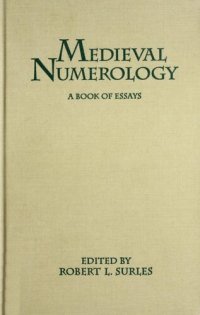
Ebook: Medieval Numerology: A Book of Essays
Author: Robert L. Surles (ed.)
- Genre: Literature
- Series: Garland Reference Library of the Humanities 1640. Garland Medieval Casebooks 7
- Year: 1993
- Publisher: Garland Publishing
- City: New York
- Language: English
- pdf
Numeracy must surely predate literacy and any notion of the recorded history of man. Numbering, counting and enumerating are requisite means for intellectual orientation, and numerology, which the Swedish philologist Gunnar Qvamström has called "the semantics of number," is as traditional and far-reaching as Greco-Roman classicism and as old and arcane as Germanic runes. It is currently felt that metaphor, or any other figurative device should serve to "concretize" abstract ideation into a concept more readily accessible to general comprehension. Another current generalization is the thought that mathematics may be understood as a language sufficient unto itself without need for interpretation into any other idiom. Yet it must here be said that neither of these understandings were fastly maintained in earlier times. The history of number symbolism is traced in the work of Vincent Hopper, whose views have come to define medieval number philosophy for the modem scholar. Beyond what Hopper calls "elementary" numbering, derived from certain fixed natural groups, i.e the hand for five, the figure of a man for twenty (with both hands and feet counting), etc., the Babylonian science of astrology saw divine orders of numbers in astronomical cycles and constellations. Yet another view of number grew out of the Pythagoreanism of Greece, fixing the relationship of numbers to one another and to the Cosmic Order. The dominant medieval attitude towards number symbolism in the West, however, was the Christian — which, in its turn adopted and adapted the majority of Plato’s concepts.
The influence of numerology in the medieval period on thought and literature, and, indeed, one must say on all art can hardly be undervalued nor (perhaps) properly appreciated in modem times. It is not difficult to suppose that the artist or thinker, with such examples before him, would strive to imitate in the microcosm of his work those creative procedures which he had come to believe God had used in the macrocosm of His creation. Nonetheless, whether or not the use of number would be discernible or properly appreciated by his "audience," while significant, might not have been of first importance to his craft. What must have been of transcendental value to the artist would be the belief that, since the thing he wished to create had been "ordered" in the proper manner, it would be good and in harmony with all creation.
The influence of numerology in the medieval period on thought and literature, and, indeed, one must say on all art can hardly be undervalued nor (perhaps) properly appreciated in modem times. It is not difficult to suppose that the artist or thinker, with such examples before him, would strive to imitate in the microcosm of his work those creative procedures which he had come to believe God had used in the macrocosm of His creation. Nonetheless, whether or not the use of number would be discernible or properly appreciated by his "audience," while significant, might not have been of first importance to his craft. What must have been of transcendental value to the artist would be the belief that, since the thing he wished to create had been "ordered" in the proper manner, it would be good and in harmony with all creation.
Download the book Medieval Numerology: A Book of Essays for free or read online
Continue reading on any device:

Last viewed books
Related books
{related-news}
Comments (0)